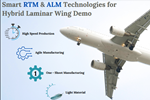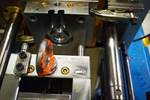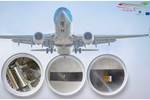INN-PAEK project succeeds in 100% recyclable turbine
European project replaces complex-shaped metal structure in aircraft cooling system with injection molded thermoplastic composite material for improved sustainability.
Share
Read Next
Carbon fiber-reinforced PAEK composite turbine wheel and flange demonstrated in INN-PAEK project. Photo Credit: INN-PAEK project, Aitiip Technology Center
(Zaragoza, Spain), in collaboration with the (Bulle, Switzerland), has completed the three-year European project and achieved promising scientific-technical results. CW reported on the project’s goals in January 2023. Aitiip has now succeeded in developing an innovative proprietary technology that enables the production of parts with complex geometries using thermoplastic composite materials and one-shot injection processes.
INN-PAEK has successfully demonstrated these materials and processes by manufacturing a turbine used in aircraft cooling systems. Aitiip reports that this is a revolutionary demonstrator — until now, only metallic materials had been used. In contrast, thermoplastic polymer composites reinforced with carbon fiber offer advantages such as lightweight, high mechanical properties, resistance to corrosion, moisture and chemicals, as well as improved versatility. They can also be recycled at the end of the part’s useful life and reused for the manufacture of new parts.
INN-PAEK’s technological solution makes it possible to replace the conventional manufacturing process of today’s metal turbines, where the various parts are welded together, with an injection molding process that favors “one-shot” production, thus optimizing cycle time, energy consumption and cost reduction. Aitiip has adapted this injection process to the particular and complex geometry required for the production of these aircraft cooling turbines, while using a lighter weight, more sustainable construction.
INN-PAEK was able to demonstrate materials and processes to enable a 40% weight reduction and 30% cost reduction, as well as improve sound absorption properties in the final part. The project’s results are offered as an advanced, more sustainable and environmentally friendly production system from which the aviation industry of the future can benefit. This industry is being redirected by Europe towards circularity that will require alternative structures and components in the coming years to achieve the goal of reducing fuel consumption and CO2 emissions by 20%. It is estimated that some 40,000 new aircraft will be needed over the next two decades to meet transport needs.
INN-PAEK's research has received almost €800,000 in funding from the Clean Sky 2 Joint Undertaking, now Clean Aviation, within the European Union’s Horizon 2020 framework program.
Related Content
-
Development of a composite liquid hydrogen tank for commercial aircraft
Netherlands consortium advances cryogenic composites testing, tank designs and manufacturing including AFP, hybrid winding, welding of tank components and integrated SHM and H2 sensors for demonstrators in 2025.
-
The potential for thermoplastic composite nacelles
Collins Aerospace draws on global team, decades of experience to demonstrate large, curved AFP and welded structures for the next generation of aircraft.
-
Plant tour: Aernnova Composites, Toledo and Illescas, Spain
RTM and ATL/AFP high-rate production sites feature this composites and engineering leader’s continued push for excellence and innovation for future airframes.






